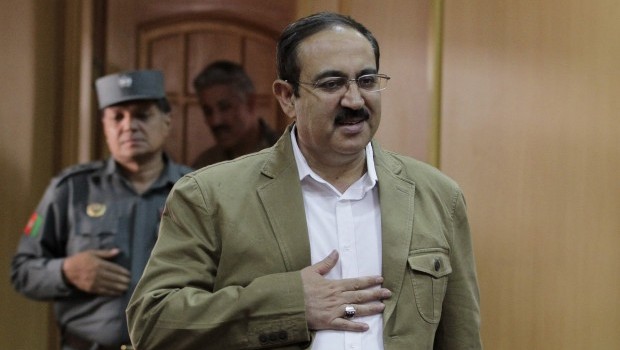
Afghan Interior Minister Mushtaba Patang arrives at the interior ministry in Kabul, Afghanistan, Monday, July 22, 2013. Source: AP Photo/Ahmad Jamshid
Kabul, Reuters—Afghanistan’s parliament voted on Monday to dismiss one of the country’s top security chiefs by impeaching the interior minister in a potential blow to stability as NATO-led international forces speed their withdrawal from the country.
Fractious lawmakers said Ghulam Mujtaba Patang, head of a 157,000-strong police force for less than a year, had been unable to tackle a worsening security environment, which included insurgent attacks on the major highway from the capital Kabul to the southern city of Kandahar.
“I ask the president of the Islamic Republic of Afghanistan to announce another person for this position,” said speaker of parliament Abdul Rauf Ibrahimi after the ballot, in which Patang secured just 60 votes, against the 136 cast against him.
President Hamid Karzai said he had not yet decided whether to accept the vote, as his administration tries to shore up stability ahead of presidential elections and a pullout of NATO troops, both due next year.
Karzai said Patang would stay as acting minister while he sought legal advice from Afghanistan’s Supreme Court on the procedure, meaning a decision could take weeks or months.
“Parliament has the right to make these impeachment decisions,” Karzai said. “But at the same time, I want to be clear the vote was based on accurate results and according to the law.”
The sacking came on the day that America’s top military officer, General Martin Dempsey, chairman of the joint chiefs of staff, arrived in Kabul to try and reopen talks on an agreement for a reduced number of US soldiers and advisers to stay in the country beyond next year’s withdrawal deadline.
Karzai suspended the talks in anger over US and Pakistani efforts to support a Taliban political office in the Gulf state of Qatar, arguing that insurgent leaders had been allowed to behave like a government in waiting.
Lawmakers said Patang, a former provincial police chief well liked by Karzai’s Western backers, also failed to fight corruption in his force and ignored a summons to parliament, which has increasingly flexed its muscle in the face of Karzai’s grip on power.
In a startling revelation, Patang said 2,748 police officers, or about two percent of the force, had been killed by insurgent gunmen since March 21. But his office later clarified the figure to say it included officers wounded in fighting.
Patang argued it was the job of the more heavily-armed military to protect remote areas and highways, including the vital economic lifeline running south to Kandahar.
“I’m on the threshold of NATO’s withdrawal,” he said. “There will be lots of problems, there will be lots of challenges. From March 21st up to now, I swear to god, 2,748 police have been martyred. Imagine what effect it has on my mind.”
Both Afghan security forces and coalition commanders have been keen to talk up improving security under Afghan oversight, though the commander of Afghan border provinces close to Pakistan said this month that insurgent numbers had risen in the east.
Last August the parliament voted to remove former Defence Minister Abdul Rahim Wardak and then Interior Minister Bismillah Mohammadi over a series of insurgent assassinations of top officials and incidents of cross-border fire with neighbouring Pakistan.
Patang, a majority Pashtun and professional police officer, had risen swiftly in Karzai’s government, leading efforts to train police and volunteer militias, and forging close ties with Western donors as a liaison with NATO reconstruction teams.
Patang said the parliament appeared to have been taken over by “political wolves” determined to bring him down, and accused the body of bowing to “mafia-like groups” within it.
“There is no doubt that day by day the security situation is becoming worse,” said political analyst Bashir Bezhan.
“But it was not logical to disqualify a minister who has disclosed corruption among some MPs. Some parliamentarians were looking for such a chance to disqualify him.”
